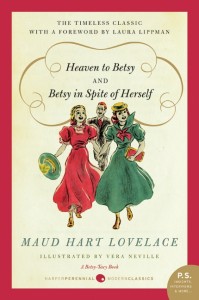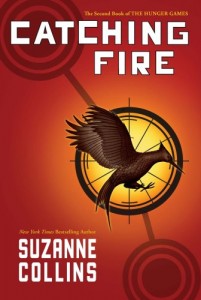Archive for September, 2009
September 3, 2009 @ 12:38 pm | Filed under:
Books  Tomorrow is the last day to sign up for Betsy-Tacy Convert Week.
Tomorrow is the last day to sign up for Betsy-Tacy Convert Week.
If you’d like to participate but don’t have a potential convert in mind, Bonny Glen commenters Lenetta and Anna would love to be adopted.
I’m re-re-rereading Heaven to Betsy right now. How could I resist, after all these Betsy posts? It’s the first of the high-school books, chronicling Betsy’s freshie experiences with a new Crowd of friends—irresistible! The setting is early 1900s Deep Valley, Minnesota, aka Small Town America. Betsy’s social life—a merry string of piano singalongs, football games, parties, surrey rides, school dances, and her father’s famous Sunday Night Lunches (where onion sandwiches are the stars of the show)—is enviable, but even so, Betsy grapples with doubts and difficulties:
Walking homeward, looking up at the sky, and around her at the wan landscape, she felt an inexplicable yearning. It was mixed up with Tony, but it was more than Tony. It was growing up; it was leaving Hill Street and having someone else light a lamp in the beloved yellow cottage. She felt like crying, and yet there was nothing to cry about.
She made up poems as she tramped homeward, the snow squeaking under her feet. Sometimes when she reached home she wrote them down and put htem with Tony’s notes deep in the handkerchief box. But she did this secretly.
“What has become of your writing, Betsy?” her mother asked. “Are you sure you don’t want Uncle Keith’s trunk [Betsy’s old desk] down in your bedroom?”
Betsy was sure; she didn’t want it, although she still climbed to the third floor and visited it sometimes.
Writing didn’t seem to fit in with the life she was living now. Carney didn’t write; Bonnie didn’t write. Betsy felt almost ashamed of her ambition. The boys teased her about being a Little Poetess. She felt that she would die if anyone discovered those poems in the handkerchief box, and the bits of stories she still wrote sometimes when she was supposed to be doing algebra.
This is a different Betsy from the little girl who entertained her friends with endless tales back in the old Hill Street days. To be sure, the 14-year-old Betsy is still entertaining her chums with her ready wit and lively spirits. But she hasn’t quite figured out what to do with this other side of herself, the serious, introspective side, the place the poems come from. She’ll get there, but it’ll take time. And as life changes, she’ll have to sort the sides of herself all over again: we see her still groping for balance in Betsy’s Wedding, the final book of the series. I love that; it rings quite true.
Related posts:
How I met Betsy Ray and her Crowd.
Betsy and Tacy Go Over the Big Hill
September 2, 2009 @ 6:17 pm | Filed under:
Books  Catching Fire by Suzanne Collins, the sequel to The Hunger Games.
Catching Fire by Suzanne Collins, the sequel to The Hunger Games.
I don’t care if this book got a zillion volts of buzz. I loved it anyway.
(Heh.)
What I thought before reading The Hunger Games, upon hearing the premise (dystopic society sends lottery-selected teenagers to horrific danger dome where they must battle to the death on compulsory national television): Really? Sounds sick, twisted, so grim, so brutal…and it’s YA? Really??
What I thought after reading The Hunger Games: BRILLIANT. Compelling, sensitive, deeply thought-provoking, not gratuitiously violent—necessarily violent, filled with believable, complex, imperfect characters, and totally, totally relevant.
What I thought after reading Catching Fire: this series is going to turn out to be one of the most important (and again, relevant) of the decade. And I don’t mean YA series: I mean one of the most important book series, period. Because on top of being incredibly gripping, chew-your-nails-off storytelling about characters you will never, ever forget (Haymitch!), these books explore the dangerous possibilities of a government that manipulates the media and erases civil liberties. And the power of reality television to alter people’s actions—and to influence public opinion. And the power of public opinion to alter people’s actions. And the compromises people will make in the name of security. And the paralytic effect of loss of privacy. Suzanne Collins has tackled (is tackling: the story is far from over) some of the thorniest issues we are facing here in the early days of the 21st century.
I’m not going to say anything about the plot of Catching Fire. Better to experience it as it unfolds, page by breath-stealing page.
Read it? Let’s talk in the comments.
Haven’t read it? Do! (Read Hunger Games first.) (And beware— spoilers are inevitable in any discussion of this book. I have been sitting on my fingers for months—thank goodness for Scott and Jane to talk it over with in person.)
I shared this story in the comments on Sarah’s lovely blog…it’s so funny I can’t resist telling it here too. Several years ago, when we lived in Virginia and my oldest child was about 8 or 9, I took the kids to a living history museum (the ten-awesome Frontier Culture Museum in Staunton, VA, which you do NOT want to miss if you’re in the area). That was the first of many happy visits, and a glorious spring day it was: new lambs for the holding, amiable cottage cat jumping into our stroller, Jemima Puddleduck and friends pit-pat-paddle-patting their way along the dirt paths. My three oldest girls were in heaven. The costumed interpreters were extremely nice, allowing the girls to try a spinning wheel (I was writing Charlotte and Martha in those days, and all we had at home was a drop spindle, so the wheel was a grand treat for my little home-based critique group) and answering their zillions of questions.
As we left one of the houses—I think it was the Irish cottage, which thrilled us all with its thatched roof and smoky fire, just like the huts in the Martha books—the interpreter murmured an aside to me as the girls skipped down the path.
“Are they homeschooled?” she asked with a friendly smile.
“Yes!” I replied, delighted, basking in the thought that their eager, intelligent conversation had given them away.
“I thought so,” replied the interpreter. “I could tell from the bonnets.”
Um.
This was the year my girls wore their Little House bonnets everywhere—their own doing, I swear! By then I was so used to seeing them that I hardly even noticed them anymore.
Yeah, I guess that would be kind of a giveaway.
September 1, 2009 @ 7:44 pm | Filed under:
Books “There are quiet places also in the mind,” he said meditatively. “But we build bandstands and factories on them. Deliberately—to put a stop to the quietness….All the thoughts, all the preoccupations in my head—round and round, continually, What’s it for? What’s it all for? To put an end to the quiet, to break it up and disperse it, to pretend at any cost that it isn’t there. Ah, but it is; it is there, in spite of everything, at the back of everything. Lying awake at night—not restlessly, but serenely, waiting for sleep—the quiet re-establishes itself, piece by piece; all the broken bits…It re-establishes itself, an inward quiet, like the outward quiet of grass and trees. It fills one, it grows— a crystal quiet, a growing, expanding crystal. It grows, it becomes more perfect; it is beautiful and terrifying … For one’s alone in the crystal, and there’s no support from the outside, there is nothing external and important, nothing external and trivial to pull oneself up by or stand on…There is nothing to laugh at or feel enthusiast about. But the quiet grows and grows. Beautifully and unbearably. And at last you are conscious of something approaching; it is almost a faint sound of footsteps. Something inexpressively lovely and wonderful advances through the crystal, nearer, nearer. And, oh, inexpressively terrifying. For if it were to touch you, if it were to seize you and engulf you, you’d die; all the regular, habitual daily part of you would die….one would have to begin living arduously in the quiet, arduously in some strange, unheard of manner.”
—Aldous Huxley, Antic Hay
September 1, 2009 @ 4:55 am | Filed under:
Poetry After I posted my Robert Pinsky story, I sent the link to Facebook and got this comment from Sally T., a Facebook friend I know through homeschooling—not writing—circles:
Heh — that would have been about the same time that I was poetry editor at Quarterly West, at the U of Utah. Robert Pinsky didn’t visit us, though.
To which I replied, hastily and with much excitement:
SALLY!!!!! I was one of the AWP Intro Award winners in poetry in 1993. My poem appeared in the Summer/Fall 1994 issue of Quarterly West. I just checked the masthead and you were one of the poetry editors! How’s that for a small-world moment?!
My poem was called “Lena, Waiting for the Mail,” pub’d under my maiden name, Melissa Brannon. It was my first published work.
Wow.
Seriously, wow.
Here’s the poem, if you’d like to see. Reading it now, I’m amused to see there’s a character named Mack—I must have a subconscious thing for that name. I wrote another poem once (before this one) called “Mrs. Mack.” There’s a Mack in my last Charlotte book, Across the Puddingstone Dam. And it occurs to me I’ve got another Mrs. Mack in the draft of my current work-in-progress—may have to rethink that one.
Lena, Waiting for the Mail
This time of day the split-rail fence
lays its long shadow in the road,
as far from the house as it ever gets.
Straight and mean, that shadow,
like train tracks heating up in the sun.
I’m always watching for the train.
Plenty of shadows in this yard, but no shade.
Janie and Mack crouching in the spare grass
behind me pour the dogs’ water out for mud.
The ground sucks it in, little snaps and hisses
in my ear. Eleanor wrote last time her ears
are pierced, had it done when she was four,
I can’t believe it, and she got diamonds
on her sweet sixteen. That what girls
like Eleanor call it. I bet it feels sweet to be them, curled
and black-lashed, wearing Pop’s last forty hours
through your earlobes. Davy, shouting, runs
three times around the house, gets as far as Mars
before Pop hushes him. Mack orders him to help
with the mudcastle. “Lena,” Mama calls,
“I wish you’d keep them quiet.”
Patrick McFadden wrote to say he “freefalls
from airplanes for fun.” He’s the only boy I write.
Pop thinks “Pat” is a girl. Pat loves the color blue, the smell
of coffee, and Bruce Springsteen. This mailman
will never show. Anita’s letter is due today,
and maybe Sabine Heyl’s. That fragile paper like the skin
you peel out of an open eggshell. Purple ink
like you’d write magic spells with—Janie’s blinking
back tears. Mama’ll kill me. “You kids come away
from the house,” I say. “I’ll tell you a story.” Can’t I tell
myself a good one: A girl with a hundred letters
spreads them flat like a quilt. She sticks them together
with Elmer’s since sealing wax is in short supply.
She climbs on and waves her hands in a spell.
The rustling paper rises like a prayer into the sky.
(Originally published in Quarterly West, No. 39, Summer/Fall 1994, Salt Lake City, UT.)
 Tomorrow is the last day to sign up for Betsy-Tacy Convert Week.
Tomorrow is the last day to sign up for Betsy-Tacy Convert Week.
